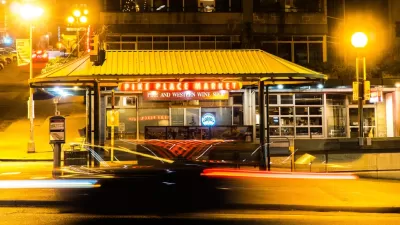It's a pattern seen as recently as two years ago in metro Atlanta: a crucial transit measure wins in the central city but dies in the more populous suburbs. The fix is to craft a city-only transit initiative—just what advocates in Seattle will do.
In opposite corners of the nation, the Southeast and Northwest, more numerous suburbanites out-voted central city residents in crucial transportation funding initiatives. Their defeats may be as much a reflection on the city-suburb split as it is a statement on transportation funding.
In the Atlanta region two years ago, a one per cent sales tax measure for transportation was defeated on July 31, 2012 and in King County, Washington a one-tenth of one percent sales tax and $60 motor vehicle registration fee to fund bus operations and road maintenance was defeated last Tuesday (April 22).
"Even though the plan known as T-SPLOST lost in all 10 Metro Atlanta counties and most regions statewide, most Atlanta voters cast ballots for the proposal. Inside city limits, T-SPLOST won by 16% of the vote," wrote Charles Edwards, the news director for NPR-affiliate, WABE in a post-mortem on the measure on August 7, 2012. [Listen here].
In Seattle, Proposition 1 supporters "are blaming suburbanites for rejecting the county measure. They said inside the city, voters are willing to spend on buses," writes the editor of Seattle's NPR affiliate, KUOW. The solution: "A new Seattle-only initiative will try to save buses inside city limits. A group called Friends of Transit said it filed the initiative with the Seattle City Clerk's Office Friday (April 25)."
As we noted Thursday, the new initiative will be a six-year property tax. Unlike county-wide Proposition 1 which directed 40% of the tax and vehicle registration fee revenues to road repair and maintenance, the new initiative will presumably use 100% of the property tax revenue for purchasing bus routes that operate at least 80% within city limits.
"Friends of Transit said that money would be used to buy back endangered routes from King County Metro. The idea of cities buying routes from Metro isn't new. King County Executive Dow Constantine says several cities in the region are doing it now.
Now the hard part. Once "the initiative is approved by the city clerk, supporters will need to gather more than 20,000 signatures to put it on the November ballot."
FULL STORY: New Bus Initiative Filed For Seattle Only, Prop 1 Continues To Fail

Study: Maui’s Plan to Convert Vacation Rentals to Long-Term Housing Could Cause Nearly $1 Billion Economic Loss
The plan would reduce visitor accommodation by 25,% resulting in 1,900 jobs lost.

North Texas Transit Leaders Tout Benefits of TOD for Growing Region
At a summit focused on transit-oriented development, policymakers discussed how North Texas’ expanded light rail system can serve as a tool for economic growth.

Why Should We Subsidize Public Transportation?
Many public transit agencies face financial stress due to rising costs, declining fare revenue, and declining subsidies. Transit advocates must provide a strong business case for increasing public transit funding.

How to Make US Trains Faster
Changes to boarding platforms and a switch to electric trains could improve U.S. passenger rail service without the added cost of high-speed rail.

Columbia’s Revitalized ‘Loop’ Is a Hub for Local Entrepreneurs
A focus on small businesses is helping a commercial corridor in Columbia, Missouri thrive.

Invasive Insect Threatens Minnesota’s Ash Forests
The Emerald Ash Borer is a rapidly spreading invasive pest threatening Minnesota’s ash trees, and homeowners are encouraged to plant diverse replacement species, avoid moving ash firewood, and monitor for signs of infestation.
Urban Design for Planners 1: Software Tools
This six-course series explores essential urban design concepts using open source software and equips planners with the tools they need to participate fully in the urban design process.
Planning for Universal Design
Learn the tools for implementing Universal Design in planning regulations.
City of Santa Clarita
Ascent Environmental
Institute for Housing and Urban Development Studies (IHS)
City of Grandview
Harvard GSD Executive Education
Toledo-Lucas County Plan Commissions
Salt Lake City
NYU Wagner Graduate School of Public Service



























